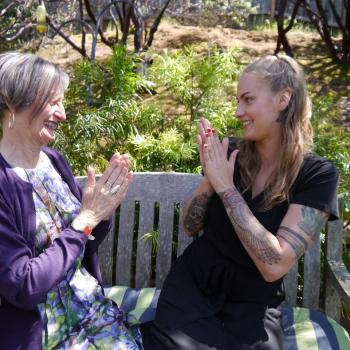"I would never hurt my mom like he did by doing that."
Mental illness can be emotional, spiritual, physical. It affects not just the person suffering; it can touch people who don't even know the one experiencing pain. I felt this most profoundly when my seventeen-year-old son's friend killed himself nearly two years ago.
Not sure what to think, do, or say, James' friends—and especially my son—asked questions out loud when I opened our house to the stream of teenagers who came and went over several days and nights. "Why did he do it?" "Why didn't I know?" "How come he was the smiley-est of us all?" "Why did I let it happen?" "How can I make sure no one else does it too?" "Why would God let it happen?" "Is he better off now?"
Between hugging sessions, where lanky boys towering above clung to me like they were little ones again, and crying spurts that went from silent sniffles to bawling, gut-wrenching screams, and giggles while collecting photos of James for his memorial poster, I pondered teenager-hood through their eyes: They typically devoured everything I cooked as soon as it came out of the oven. The guitars strummed along with their own earnest renditions of meaningful songs. Cringe-inducing fashion choices are just part of the territory.
So I saw them bond, felt their camaraderie, and realized their aloneness when I was the only parent to attend the funeral from their tight pack. I understood also the complexity of their experience as I watched my son, my heart racing, stand up to his principal against what he thought was the school's effort to suppress emotional expression after it refused to let him organize a memorial for James on campus.
The school provided counselors for students, but clearly it was a difficult balance since James "went the way he did," as the principal put it. Suicide was an ugly thing, and giving it any more attention was only making things complicated for those in charge of the welfare of so many.
In some ways, I was envious of my son and his friends' closeness and sense of purpose in their grief—remembering that at that age who you're with is all that matters and life is limitless in dreams, but finite in the role grownups allow you to play, or what you can realistically affect or control. As a teenager, too, you start to come to terms with the fact that things aren't so straightforward, so neatly arranged in life. And that though you may be scared or sad, you might have to put up a façade of strength because you really are not a kid anymore—everyone is telling you so.
Is it this shakiness that gets some into that dark space of bringing things inward? Of creating segmented lives where you appear a happy person, but really are nursing a sadness that has no words and are perhaps hurting yourself with no other way to express it?
Sometimes young ones decide to take their lives because this undefined sadness is too much to bear, sometimes for supposed grand ideological reasons. The rest of us are left with an emptiness that we have to work together to fill, and maybe making that effort helps keep someone else from the same fate.
It has been nearly two years since James' death—a long time in this day of immediate and quick-moving socially connected experiences. And yet this emptiness still comes into the shared spaces I have with my son; sometimes as an anger I know is not directed to me, but a part of his growing and negotiating a balance. He regularly visits the graveyard, spends much time with his friends in an effort to "just talk about how we feel." And his sense of responsibility as a friend is so strong it sometimes gets in the way of him doing what he needs to do for himself. So I regularly consider ways to be there for him, to help all of them through both the continuing feeling of loss, as well as keep at bay their normal teenage ups and downs.
I felt this need to connect and support the circle of friends immediately after James' funeral. Out of that, I wrote and, through Facebook personal messages, shared this letter to my son and his friends after the burial, which was punctuated by a light snowfall. I did it more in hopes of giving them each tools to deepen their friendship, but also to use this sad occasion to build themselves as individuals.
And I have realized, since I first shared it, that grief is an ongoing process of healing, and as a society—not only the mental health professionals—we have to continue to be there for those who are distressed emotionally and otherwise.
I always thought I could never handle having a daughter, as they are stereotypically considered dramatic. I am blessed with three boys who teach me all sorts of things every day. I especially have learned that it's not about the drama—which happens regardless—but about the love. Everything is. About how it's felt, shared, and created.




